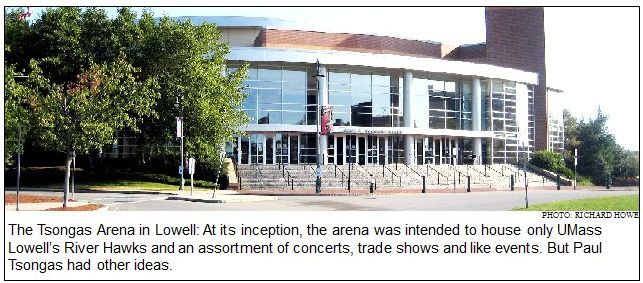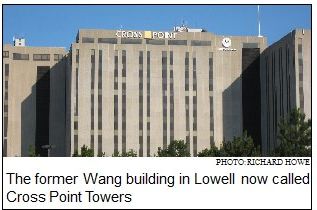
A tale of two venues in
Lowell
Richard Howe
 The city of Lowell is the
home of two professional sports
franchises: The Lowell Devils of the
American Hockey League and the Lowell
Spinners, the Class A affiliate of the
Boston Red Sox. During the decade of
their mutual existence, the fortunes of
the two teams could not have been more
different. The Spinners have been wildly
successful, selling out almost every game
while the Devils are chronically last in
league attendance. But the two teams have
one thing in common. They are both
embroiled in landlord-tenant disputes
with the city of Lowell. The resolution
of these controversies could lead to one
or both teams leaving Lowell in the
coming years. The city of Lowell is the
home of two professional sports
franchises: The Lowell Devils of the
American Hockey League and the Lowell
Spinners, the Class A affiliate of the
Boston Red Sox. During the decade of
their mutual existence, the fortunes of
the two teams could not have been more
different. The Spinners have been wildly
successful, selling out almost every game
while the Devils are chronically last in
league attendance. But the two teams have
one thing in common. They are both
embroiled in landlord-tenant disputes
with the city of Lowell. The resolution
of these controversies could lead to one
or both teams leaving Lowell in the
coming years.
One of the darkest days in Lowell’s
history was February 15, 1994. Late that
morning, the Wang Towers, icons of Lowell’s
rebirth as a center of hi-tech
manufacturing and assessed by the city at
$40 million, were sold at foreclosure
auction for just $525,000. Deep in the
midst of the last real estate bust and
with the city’s finances still under
the supervision of a state-appointed
control board, the future looked bleak.
But even as the city’s fortunes hit
bottom, plans for Lowell’s
resurgence were already underway.
When Paul Tsongas returned to Lowell from
his unsuccessful quest for the Democratic
nomination for the presidency in 1992,
his focus turned inward to the city of
his birth. Tsongas was convinced that
without a vision, a shared goal to work
towards, cities like Lowell would wither
and die. Tsongas’s vision for Lowell
involved the construction of a
multipurpose arena that would make the
city a regional destination for
family-oriented sports and entertainment
while also serving as a catalyst for
downtown revitalization. To achieve this
goal, Tsongas formed a web of alliances,
some very public, others known to but a
few.
 So it
was on the same day that the mortgage on
the Wang Towers was foreclosed, the
University of Massachusetts Lowell agreed
to join with the city of Lowell in
building a 6000 seat arena located not on
the University’s campus, but at Post
Office Square, just at the edge of
downtown Lowell. The earliest conception
of the arena included an adjacent
practice rink, multiple luxury boxes, and
a state of the art video scoreboard, but
that version’s $45 million price tag
was deemed too expensive. After a year of
bitter fights on the council floor, the
practice rink, the luxury boxes and the
elaborate scoreboard were all eliminated
and the arena’s price tag had slid
to $28 million. With a $20 million
contribution from the state and $4
million each from the city and the
university, the arena was built, opening
in January 1998 and named for Paul
Tsongas, who had passed away a year
earlier. So it
was on the same day that the mortgage on
the Wang Towers was foreclosed, the
University of Massachusetts Lowell agreed
to join with the city of Lowell in
building a 6000 seat arena located not on
the University’s campus, but at Post
Office Square, just at the edge of
downtown Lowell. The earliest conception
of the arena included an adjacent
practice rink, multiple luxury boxes, and
a state of the art video scoreboard, but
that version’s $45 million price tag
was deemed too expensive. After a year of
bitter fights on the council floor, the
practice rink, the luxury boxes and the
elaborate scoreboard were all eliminated
and the arena’s price tag had slid
to $28 million. With a $20 million
contribution from the state and $4
million each from the city and the
university, the arena was built, opening
in January 1998 and named for Paul
Tsongas, who had passed away a year
earlier.
At its inception, the arena was intended
to house only UMass Lowell’s River
Hawks and an assortment of concerts,
trade shows and like events. But Paul
Tsongas had other ideas. Initially
partnering with Boston Bruin’s great
Bobby Orr (who later dropped out of the
picture), Tsongas persuaded the Board of
Governors of the American Hockey League
to locate an expansion team in Lowell for
the 1997 season.
Paul Tsongas’s vision for Lowell was
a complex one that also involved
professional baseball. Even as the fight
for the arena was being waged, Tsongas
brought together Clyde Smoll, the owner
of the Elmira Pioneers, the Class A
affiliate of the Florida Marlins and Dan
Du-quette, then the GM of the Boston Red
Sox, who wanted all of the minor league
affiliates of the Red Sox to be located
in New England. Smoll, who was
disappointed by the city of Elmira’s
refusal to refurbish the Pioneer’s
stadium, agreed to move his franchise to
Lowell and Duquette agreed to supply the
players.
All that was left was to find a place to
play. Using the same recipe that financed
the arena, Tsongas orchestrated
contributions from the Commonwealth of
Massachusetts, UMass Lowell and the city
of Lowell to build a 5000 seat base-ball
field. Even though LeLacheur Field was
not com-pleted until 1998, the new team,
known as the Lowell Spinners, began
playing at a renovated high school
fa-cility in Lowell in 1996. Combining
inexpensive tickets, a family-friendly
atmosphere, a short, mid-June to Labor
Day schedule and the best prospects in
the Red Sox organization, the Spinners
have been a huge success.
Ironically, now that the lease on
LeLacheur Field is a-bout to expire, the
team’s success is working against
it. There are those in city government
who harbor hostility towards the Spinners
that manifests itself when city council
discussions turn to the lease renewal. It
appears that reason will prevail,
however, with an equitable lease renewal
that will keep the Spinners in Lowell the
likely result.
Unfortunately, there is no cause for
optimism when it comes to the city’s
American Hockey League franchise. Almost
from its inception, the hockey team has
struggl-ed. Delays in the arena’s
construction schedule caused the new
owners of the team, initially known as
the Low-ell Lock Monsters, to push back
the team’s unveiling from 1997 to
1998 which bled off important early
mo-mentum in the community. When the team
did begin playing, ticket prices may have
been reasonable by NHL standards, but
were excessively pricey for Greater
Low-ell. Unlike the Spinners, whose best
players eventually made their way to the
home-town Red Sox, the stars of the Lock
Monsters graduated to the New York
Islanders. Revolving door affiliations
that led from the Islanders to the LA
Kings to the Carolina Hurricanes to the
Calgary Flames to the Colorado Avalanche
to the New Jersey Devils made it almost
impossible for local fans to follow
graduates of the Lowell hockey team in
the NHL. This litany of bad decisions and
bad breaks along with a communal
ambivalence towards hockey combined to
suppress attendance to embarrassingly low
levels.
Poor attendance results in poor revenue
for all involved. Consequently, the city
of Lowell has been subsidizing the arena’s
operation with up to $1.5 million per
year, a condition that cannot continue.
There is growing sentiment that the city
should cut its losses immediately by
find-ing a way to transfer the arena to
UMass Lowell. Such a move, however, would
be short-sighted and would deprive the
city of one of its most valuable assets.
Remember, none of the original plans for
the arena involved a professional hockey
franchise. While seeing “Lowell”
on the AHL schedule evokes civic pride,
it also eats up 40 prime dates of arena
availability that could otherwise be used
for concerts, trade shows and other
events.
If the hockey games were well atten-ded,
the resulting revenue might offset the
loss of other activities, but hockey
attendance has always been abysmal. A
fair evaluation of the arena’s
viability can only be made after the
professional hockey team departs which
will presumably occur in 2010 when its
lease expires. With the AHL era over, the
region’s hockey fans will gravitate
to the very competitive Hockey East games
played by the UMass Lowell River Hawks
and the arena’s management team will
finally have a chance to bring in the
kind of money making events that were
originally contemplated for the arena.
Only after that occurs will the city be
able to accurately assess the arena’s
profitability and make a reasoned
decision about its future.
Richard P. Howe Jr. is the creator of
www.richardhowe.com,
a blog that provides commentary on
politics in Lowell. He also serves as
Register of Deeds of the Northern
District of Middlesex County. You can
email him at lowelldeeds@comcast.net
>>>>>>>>>>>>>>>>>>>>>>>>>>>>>>>>>>>>>>>>>>>>>>>>>>>>>>>>>>>>>>>>>>>>>>>>>>>>>>>>>>>
>>>>>>>>>>>>>>>>>>>>>>>>>>>>>>>>>>>>>>>>>>>>>>>>>>>>>>>>>>>>>>>>>>>>>>>>>>>>>>>>>>>>>>>>>>>>>>>>>>>>>>>>>>>>
All
pictures and material are
(C) copyright, Valley Patriot, Inc., 2008
|